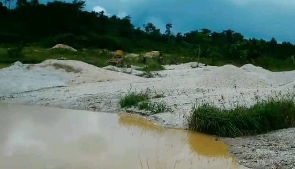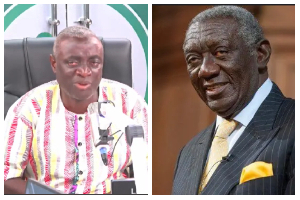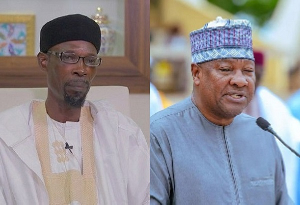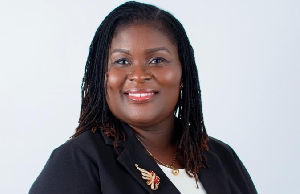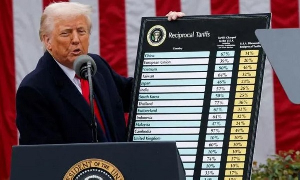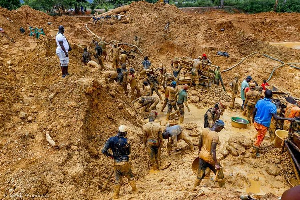I was looking for a full presentation of the proceedings at the launching of the autobiography of Professor Kwesi Yankah on YouTube when I came across the same author’s speech at the launching of his earlier book, The Missing Pages of June 4.
Now, one of my regrets in life is to have been obliged to spend over 30 years outside this country. It’s true that not all the 30 years were wasted, because I did gain more knowledge about the world outside Ghana. And that, quite often, enables one to sift the information one has deposited in one’s memory bank about one’s own country much better.
But the huge chunks of empty space that my brain retrieves when certain words enter my hippocampus, can be embarrassing to someone who presumes to inform others about events in his own country.
I mean, take this: when my daughter-in-law generously brought me a copy of The Woes of A Kwatriot in London, I had NOT heard of Kwesi Yankah. I knew the Yankahs – Kojo (ex-Regional Minister, Ashanti) and Eric (ex-VRA.) But not Kwesi. And yet, as the owner of such literary mystery names as Sisiriamako and Kookooase Adowa, “Obonsam Fireman” and I ought to have been brother palm wine drunkards. Alas: you can’t have everything in life.
The reason why I was trying to find the video presentation of the launching of Kwesi Yankah’s autobiography, The Pen At Risk, is that although the little bit that has come into the media of what he said at the event has been a bit mangled (for instance, the world collection of malapropisms will be enriched by the fact that he was reported to have said twice that galamsey could not be defeated only by moral “switching” (obviously, the writer meant moral “suasion”!) what he did say was of great consequence.
What I managed to gather from the mangled media reports is that he suggested that our leaders should not only be thinking about waging military campaigns in other countries but also about fighting “the internal war” being waged against Ghana by those who were destroying Ghana’s forest reserves and rivers through galamsey.
The galamseyers were “using weapons”, but did we know in what quantities? Did we know how far they would take their warfare against Ghana? (Prof. Kwesi Yankah asked).
As far as I know, the Prof. is the only major figure in Ghana who has fully acknowledged IN PUBLIC, the full nature of the galamsey calamity. One other person told me privately that the struggle to eliminate galamsey would be more difficult and more costly than Ghana’s anti-colonial campaign that won us our independence, because “it is a fight by us against ourselves!”
How many of our professors and other learned academics would make public statements like that about galamsey, without worrying whether anyone would be annoyed by it or not?
Our “notables” accept and bask in the respect our society generously bestows on “achievers” in our midst. But what do these achievers do for our society, in return?
Since around 1989, politicians with a populist axe to grind have launched programmes meant to enable “artisanal or small-scale gold miners” to obtain concessions on which to dig for gold.
To rationalise what they have been doing, the politicians employ highly emotive verbiage and slogans, such as: “We live on gold and yet have no food to eat, or “We allow foreign mining firms to dig our gold and carry it to Europe and America to sell and become very rich. And they leave us with nothing – except a ruined environment and poverty!” Who can resist cheering up those who make such statements? More important, who can refuse to vote for them at elections?
But behind the populism, is always a calculated commercial effort: through bribery, or favouritism, licences to PROSPECT for gold are turned into licences to MINE. Concessions granted for operations outside forest reserves, are unilaterally extended to encompass areas clearly delineated as forest reserves.
Who is to ENFORCE the laws and regulations governing the operations of artisanal miners? The very people in the Government departments and commissions who knew that it would be easy to cause confusion in everyone’s mind by making it possible for a prospecting licence to be used as a mining licence! Until the mining police (if any!) arrive! By which time, “what needs to be done” would have been done!
So, now, all the big rivers that give us drinking water – Ankobrah, Tano, Birim, Densu, Offin, Tanoh etc – have become polluted. Cocoa farms and food farms are being turned into galamsey sites.
But our chiefs and company chief executives; our academics and our educated professionals; see nothing and hear nothing about the existential threat that we have hung around our own necks like a sword of Damocles.
In my quest for relevant videos for this article on YouTube, I came across a ceremony at which a newly-promoted Professor of the University of Ghana, was to give his inaugural address in the Great Hall at Legon.
In the display area adjacent to the Great Hall, a very proficient ensemble from the “dondology” (!) department, were playing a heart-warming bit of traditional music, and a very good dancer was doing it justice.
Then, someone pushed a lad of about three years of age forward, and encouraged him to watch what the old man was doing, and imitate his movements. Reluctant at first, he soon got “the beat” and began to dance quite well.
Then, the tears welled up in my eyes. I asked myself: “Will this boy survive to dance to a Ghanaian traditional number – full of joy and beauty, like he’s now doing, as a mature man, if Ghanaians allow their rivers and forests to continue to be wantonly destroyed by the galamsey lot, as they are doing now?
I next had to run into the bathroom to dry my eyes. Woe unto a nation whose elites are too apathetic to save it from self-destruction.
Opinions of Wednesday, 13 September 2023
Columnist: Cameron Duodu

